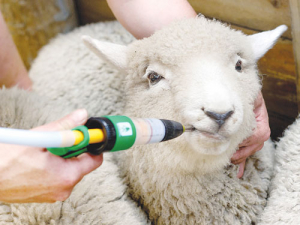NZ scientists make breakthrough in Facial Eczema research
A significant breakthrough in understanding facial eczema (FE) in livestock brings New Zealand closer to reducing the disease’s devastating impact on farmers, animals, and rural communities.
 AgResearch animal health scientist, Dr Dave Leathwick says resistance to triple combinations drenches is always a consequence of management practices and decisions.
AgResearch animal health scientist, Dr Dave Leathwick says resistance to triple combinations drenches is always a consequence of management practices and decisions.
Livestock monocultures and inappropriate drenching practices are helping raise internal parasite resistance to triple combination drenches, says AgResearch.
And the problem is mostly avoidable, says animal health scientist Dr Dave Leathwick.
He says resistance to triple combination drenches always arises from management practices and decisions, typically either running a single enterprise on the one property, e.g. lamb finishing or bull beef or excessive use of long-acting drenches.
Lamb finishing is especially knotty, with finishers buying in large numbers of animals on the open-market and bringing other peoples’ worm problems onto their own property.
Lambing finishing under irrigation is even worse, creating a “worm factory,” says Leathwick.
The risk is similar in dairy bull finishing, with the added complication of the emergence of drug resistance in Ostertagia, a worm that severely limits production.
Leathwick says farms where parasites are resistant to more than one triple combination drench could face having to markedly change their operations to deal with the problem.
“For these farmers it’s going to be a serious issue and they are going to struggle with this.”
But he hasn’t yet seen a case of triple combination resistance that wasn’t entirely predictable, he says.
“My message for farmers is, if you keep ignoring what the science says there will be consequences -- inevitablly. Drug resistance is not a random event.”
Leathwick says we know many of the factors that lead to resistance and if you do the right things resistance need not be an issue.
On many farms every drench class is still 100% effective against all worms, but farmers must stick to best-practice parasite control and drenching to retain those drugs’ efficacy.
A good example is drenching lambs every 28-30 days from the start of December, irrespective of how well the lambs are doing.
Leathwick says in good springs, when feed is plentiful and stock are doing well, farmers will often delay or extend the period between drenches. This just increases pasture contamination with worm larvae so that in autumn farmers will suddenly struggle to finish lambs and performance will drop.
He says the strict 28-30-day drenching regime was designed in the 1970s to manage pasture contamination – not because the lambs needed drenching at the time; failure to follow this will often bring problems later in the season.
“If you follow it – rigorously – you will have a much lower risk of problems later in the year.”
He says too often farmers think of drenching as a monthly event.
“But when one drench is at the start of the month and the second at the end of the following month, this can be up to seven weeks between drenches which is too long. It needs to be 28-30 days.”
For the same reason, Leathwick doesn’t recommend basing lamb drenching decisions on faecal egg counts.
“It doesn’t work. You will only end up drenching in autumn and winter and in the mean-time you’ve lost production. The reason you drench lambs in spring and summer is not because the animals need a drench, but to prevent pasture contamination later in the season.”
But he recommends occasionally collecting faecal samples a week after drenching lambs to search for eggs, and if they are present get a picture of the larvae differential.
Leathwick says faecal eggs counts don’t show the full picture. For example, a 500-egg count in a mixed-age ewe might be made up of Cooperia and Longtail parasites, which have no or limited pathology.
Compare that to a 500-egg count in a 35kg lamb that is made up of the production-limiting internal parasites Trichostrongylus and Ostertagia and it is a very different scenario.
“A farmer with a good eye is better than a FEC at deciding whether an animal needs drenching or not.”
Leathwick says internal parasites are not always the problem in poor performing animals, but drenching is a good place to start.
Fruit trader Seeka posted a record profit and returns to shareholders in 2025.
Recent weather events in the Bay of Plenty, Gisborne/Tairawhiti, and Canterbury have been declared a medium-scale adverse event.
DairyNZ's chief executive Campbell Parker says the 2024/25 dairy season reinforces the importance of the dairy sector to New Zealand.
A New Zealand agribusiness helping to turn a long-standing animal welfare and waste issue into a high-value protein stream has won the Australian dairy sector's top innovator award.
OPINION: A bumper season all around.
Dairy Women's Network (DWN) has announced that Taranaki dairy farmer Nicola Bryant will join its Trust Board as an Associate Trustee.

OPINION: A mate of yours truly reckons rural Manawatu families are the latest to suffer under what he calls the…
OPINION: If old Winston Peters thinks building trade relations with new nations, such as India, isn't a necessary investment in…